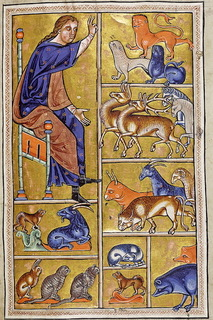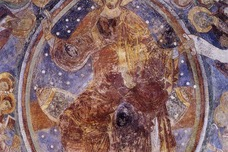Sunday Reflection with Canon Robin Gibbons: 6 October 2024

Aberdeen Bestiary Folio 005r Adam Names Animals
Twenty-seventh Sunday in Ordinary Time
The LORD God said: It is not good for the man to be alone. I will make a helper suited to him. Genesis 2:18
These words herald the naming of all creatures on the earth and lead up to the creation of the two distinct sexes of humankind, but be careful, this is only part of the great creation story of Genesis 1 and 2, a composite narrative of two main stories of origins. Both are not meant to be taken literally, and this is important, for both of the stories have no historical meaning in the sense of factual history or straightforward timelines, nor can they be related as an historical narrative, that leads to serious theological problems , rather they are the telling of the wonders of creation in terms of the story of God's gift to, from and with us, in words of poetry, prayer, story what we can call myth. But this does not mean they are a fable, because they take us back to the time our ancestors told stories of the deep origins of all this earth and the worlds beyond it, and in poetry and song handed them on, liturgical tales that were easy to identify and understand but which, at their heart, carried the deepest message of all; that the God of our salvation is the beginning and end of all that is. As a recent article by Rabbi Geoff Mitelman puts it;…'we look at the words themselves, their style, and the word choices. The text's style reminds us that while the universe is naturally chaotic and unpredictable, we, like God, can strive to bring a little more order and a little more blessing in our lives. Most of all, even if Genesis is not a science textbook, as my friend and colleague Cantor Ellen Dreskin would say, "Something doesn't have to be factual for it to be true."'
Perhaps when faced with this particular portion of scripture from Genesis and the detailed argument about situations of religious divorce in this weeks gospel, we might do well to remind ourselves that Jesus himself is explaining in terms of process, taking a position, not creating the definitive doctrine. In actual fact when we read the context of the situation and sense the meaning behind the question of the Pharisees, we can discern that Jesus is being asked what school of thought does he follow, he is not teaching some doctrine 'de novo' but responding from a position. Nor, and this might shock a few people , is he making any comment about ontological change, two becoming one, etc . What Jesus is doing is challenging us to look at the many issues surrounding this ( and so many other problems), and strive, pastorally, knowledgably and in genuine compassion, to bring a little more loving order into any situation where decisions have to be made. We are after all talking about key relationships here, matters of conscience and matters of serious import. I suppose my own thought is that we take good acre to study the background, know the facts and assess as Jesus does what is the best option for those concerned.
But this brings me back to Genesis and to that section of poetic naming , where the biblical first human names animals with Gods help. This for me is profound, because naming is a hugely important activity. What it is not is domination, naming in terms of property or belonging, instead isn't it to do with drawing out of the creature its essence, and in doing so place them, not under our dominion but under God's protection. We all talk much about ecology and climate change but now see daily the extinction of species that have a right to live on this planet, as much as we do, the destruction of habitat and green space. We note the huge shifts in weather and the tragedies that are unfolding and all, yes all, because of our failings. We cannot divorce our human existence from other forms of life and we owe it to ourselves and them all, to strive daily to repair, heal, and reconcile.
Its too late for some life forms and habitats, they are now gone, but it is never too late to love better in our human relationships, in our concern and care for animals and life on this little blue planet. It is never too late to be a blessing on others, nor to work towards greater understanding, but it is, as Jesus does today, to' bring a little more loving order into any situation where decisions have to be made'. We are the real helpmates of God, for all relationships on this little earth!
LECTIO
Prayer of St Francis, Patron Saint of Animals and Ecology
Most High, glorious God, enlighten the darkness of my heart and give me true faith, certain hope and perfect charity, sense and knowledge, Lord, that I may carry out Your holy and true command. Amen
Prayer of Saint Basil
'The Earth is the Lord's and the fullness thereof. O God, enlarge within us the sense of fellowship with all living things, our brothers and sisters the animals to whom thou has given the earth as their home in common with us. We remember with shame that in the past we have exercised the high dominion of humankind with ruthless cruelty, so that the voice of the earth, which should have gone up to Thee in song, has been a groan of travail. May we realise that they live, not for us alone, but for themselves and for Thee, and that they love the sweetness of life.'
The wider context of Divorce in Matthew 19:7-14
7 "Why then," they asked, "did Moses command that a man give his wife a certificate of divorce and send her away?"
8 Jesus replied, "Moses permitted you to divorce your wives because your hearts were hard. But it was not this way from the beginning. 9 I tell you that anyone who divorces his wife, except for sexual immorality, and marries another woman commits adultery."
10 The disciples said to him, "If this is the situation between a husband and wife, it is better not to marry."
11 Jesus replied, "Not everyone can accept this word, but only those to whom it has been given. 12 For there are eunuchs who were born that way, and there are eunuchs who have been made eunuchs by others-and there are those who choose to live like eunuchs for the sake of the kingdom of heaven. The one who can accept this should accept it."
The Little Children and Jesus
13 Then people brought little children to Jesus for him to place his hands on them and pray for them. But the disciples rebuked them.
14 Jesus said, "Let the little children come to me, and do not hinder them, for the kingdom of heaven belongs to such as these." 15 When he had placed his hands on them, he went on from there.


















